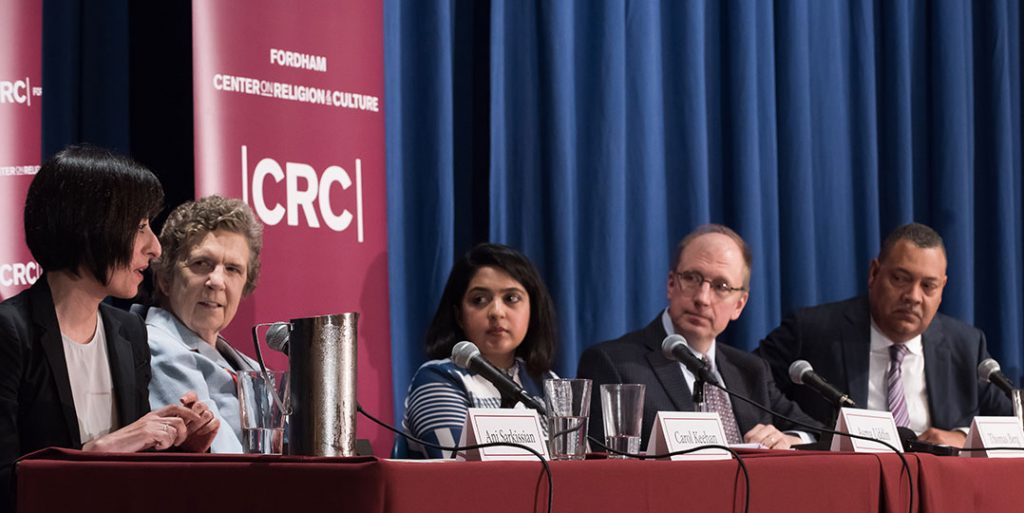The freedom to pursue one’s religious beliefs is in danger of being overwhelmed by political and cultural divisions, according to panelists at a May 17 presentation on the Fordham campus.
“And Justice for All? The Promise of Religious Liberty in a Pluralistic World,” an event sponsored by Fordham’s Center on Religion and Culture, featured
Thomas Berg, professor of law at St. Thomas University;
Carol Keehan, D.C., CEO of the Catholic Health Association;
Asma Uddin, director of strategy at the Center for Islam and Religious Freedom;
and Ani Sarkissian, Ph.D., associate professor of political science at Michigan State University and author of The Varieties of Religious Repression: Why Governments Restrict Religion (Oxford University Press, 2015).
Berg lamented the fact that support for recent high-profile religious freedom cases has split along partisan lines. Liberals showed little interest in the rights of Christians in 2014 when the Supreme Court exempted Hobby Lobby from requirements to cover certain contraceptives for employees.
Conservatives, meanwhile, have shown little sympathy for a proposed ban of Muslims from entering the country, he said. If religious freedom is lumped together with arguments about race, class, and gender, “[it]will fail in one of its chief purposes, which is to provide ground rules where people of deeply diverging views can coexist,” he said.
Uddin pointed to police surveillance, anti-Sharia laws, travel bans, and prohibitions against teachers wearing religious garb as religious freedom issues facing Muslims. Between 2011 to 2015, she noted that 25 percent of U.S. land-use lawsuits involved discrimination against mosques or Muslim schools, even though Muslims make up just 1 percent of the American population.
Sister Keehan said the Catholic Health Association came out in favor of former President Obama’s Affordable Care Act, putting her group at odds with the U.S. Conference of Catholic Bishops. She said the vitriol she was subjected to from extremists, even within her own religion, rattled her.
“We as people of faith have to be part of the solution,” said, noting that the church had expressly addressed the topic of communicating among faiths at Vatican II in the document Gaudium Et Spes.
Sarkissian compared religious freedom at home and abroad. She said that in Europe, the relationship between governments and religious institutions is one of partnership, whereas in the United States, the government is expected to stay out of religious affairs. Many U.S. religious groups want to be involved public life, but don’t want to be regulated.
Both continents find ways to favor or discriminate against religious groups, she said; she noted that Christian schools receive state funding in the Netherlands, France has banned face veils and burkinis, Germany has outlawed Scientology, and Russia has banned the Jehovah’s Witnesses. In Europe, however, discrimination is cloaked in rhetoric about foreignness, immigration, or protecting traditional culture.
“We share with Europe the idea that we protect religious liberty,” she said. “But often times our focus is on protecting liberty for the majority.
“The groups that we’re targeting with this rhetoric are often religious minorities. We’re not honest about that.”
Vincent D. Rougeau, dean of Boston College Law School, moderated the discussion.
Watch the discussion here.

